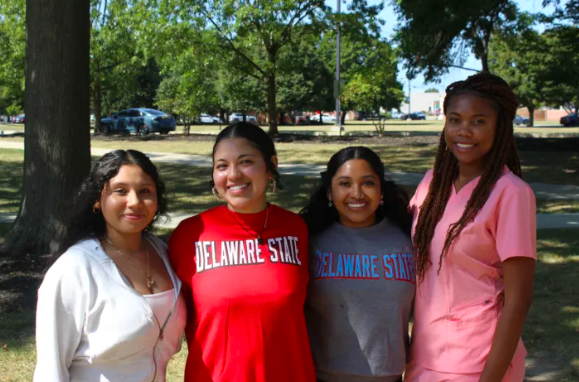This article was originally published in Spotlight Delaware.
Blanca wants to know what’s next.
She was brought to the United States as a child after leaving her home in Acapulco, Mexico, and is now preparing to graduate from Delaware State University.
She’s worried.
For nearly four years, she’s been able to pursue a degree at DSU while undocumented through TheDream.US, a national program that provides scholarships to undocumented students.
Education is at a Crossroads: Help Us Illuminate the Path Forward. Donate to The 74
The program’s full-ride Opportunity Scholarship has granted the 21-year-old college junior, who asked not to use her full name for safety concerns, the freedom to attain higher education without financial or citizenship restrictions.
Advertisement
Advertisement
But her graduation looms and that tenure is coming to an end. Without work authorization in America, she may be limited to entrepreneurship, business ownership or independent contract work — all while possessing an undergraduate degree.
“What are we going to do after college, you’re just gonna have a degree with literally nothing behind it,” Blanca asked.
She’s not alone in asking the question.
Blanca is one of at least four fully undocumented students at DSU who have received TheDream.US scholarship and are preparing to leave its benefits behind — sparking anxiety and worries about what comes next.
Advertisement
Advertisement
The Opportunity Scholarship was created by TheDream.US, a national nonprofit scholarship program backed by the New Venture Fund, for undocumented students who live in “locked out” states where they largely have no access to higher education — either because they’re forced to pay out-of-state tuition or because their state will not admit them into universities.
The scholarship covers up to $100,000 for bachelor’s degree tuition, housing, meals and fees, at five partner colleges in another state, including DSU.
The students are part of a growing population of thousands of scholarship recipients who are studying while fully undocumented.
About 74% of the over 4,500 TheDream.US scholars enrolled in college during the 2024-2025 academic year are fully undocumented, according to Hyein Lee, chief operating officer of TheDream.US. This means that three out of every four scholarship scholars are attaining higher education without any form of temporary protected status (TPS).
Advertisement
Advertisement
More in U.S.
The fears and anxieties of undocumented students have only been amplified by the precipice of a second Trump administration. President-elect Donald Trump has promised to enact nationwide mass deportations against undocumented immigrants during his second administration.
“It’s really like, what’s next,” Blanca asked. “That’s really the main question after college, ‘OK, now what?’”

(From left to right): Blanca, Elizabeth, Melissa and Nerchka are all recipients of TheDream.US Opportunity Scholarship and have been studying at Delaware State University for the past three years. (SPOTLIGHT DELAWARE PHOTO BY JOSE IGNACIO CASTANEDA PEREZ)
Seizing an opportunity
TheDream.US launched in 2014, two years after then-President Barack Obama created Deferred Action for Childhood Arrivals (DACA) through executive action. DACA was intended to provide temporary relief from deportation to thousands of young immigrants who were studying or working in the country.
A requirement of DACA was to be in school, however, higher education was largely out of reach for many undocumented students because they did not have access to federal financial aid and limited access to state aid. TheDream.US was created to help these students attain higher education.
Advertisement
Advertisement
Initially, the program was only open to students who had DACA or Temporary Protected Status, a designation that temporarily protects people who cannot return to their country safely.
The program was expanded to include fully undocumented students after then-President Trump’s administration sought to rescind DACA in 2017.
Today, there’s been over 260 TheDream.US scholarships awarded to DSU students, according to Lee.
Blanca is one of hundreds of Delawareans who meet the eligibility criteria for DACA but have been barred from entering the program because it’s been tangled in federal litigation since 2017. With new applicants barred from entering and rigid eligibility requirements in place, DACA recipients have aged and the program’s population has continuously decreased over the years.
Advertisement
Advertisement
The percentage of fully undocumented scholarship alumni without work authorization nearly tripled from 3% to 8% over two years, according to the 2024 TheDream.US alumni survey report. Many of the current scholars arrived in the country after the June 2007 cutoff date, making them ineligible for DACA under the original rules.
“Even if the program were to be operating today, many of those students would not even be eligible for the program in the first place,” Lee said.
Two days after Trump won the presidential election last month, DSU President Tony Allen sent a letter to the university’s undocumented students. Allen, who is a close ally to President Joe Biden, described being among the people who were “deeply troubled” by the election result, and underscored the university’s support for undocumented students.
“Absolutely nothing that has happened on a political level has changed or will change the University’s position of support,” the letter stated. “You are not alone, and help is and always will be here.”
Advertisement
Advertisement
Allen encouraged students to fill out a form to receive free legal consultation from the Presidents’ Alliance on Higher Education and Immigration, an advocacy group of university and college leaders.
‘OK, now what?’
Receiving the scholarship was like repeating a cycle for Elizabeth. Her mother left her family in Veracruz, Mexico, to migrate to the U.S. in search of a better life for her and her daughter.
Now Elizabeth was preparing to do the same.
Elizabeth, who also asked not to use her full name, would have to leave her family and home in North Carolina behind to study in Delaware while undocumented.
“I had to do it,” she said. “We’re young, we’re leaving everything we’ve known, our whole comfort zone, our whole comfort city, everything to come to this state where we don’t know anyone.”
Advertisement
Advertisement
Now, after nearly four years of studying in Delaware, Elizabeth doesn’t want to return to North Carolina. She wants to see her years of study pay off — but she doesn’t know what’s next.
“It’s scary,” she said. “The last thing we want to do is do all this and go back where we came from.”
Jahaira, a 21-year-old sophomore at DSU, cried when she received the Opportunity Scholarship. She came to the U.S. when she was 13 years old after being separated from her cousin at the U.S.-Mexico border near Eagle Pass, Texas.
She was sent back to Mexico where she remained in the custody of the Mexican government for six months. Her mother, who lived in Myrtle Beach, S.C., had to return to Mexico, retrieve Jahaira and cross the border again without authorization.
Advertisement
Advertisement
Sometimes, the thought of the future pops into her mind.
“What if I graduate and I can’t find a job, or no one can let me apply for a job?” Jahaira said.
TheDream.US offers internship and fellowship funding programs for undocumented students to be able to be paid for non-employment based opportunities at partner institutions. TheDream.US grants a stipend for the partner institutions to be able to pay undocumented students for professional development fellowship and internship roles.
This year, 500 such TheDream.US scholars participated in the program.
Jahaira has two years left in her business management degree under the scholarship. She has plans to open a painting company with her father, who has been painting for nearly 15 years, in order to have him eventually retire and “take it easy.”
Until then, she’s optimistic about her future after the scholarship ends.
“I still have hope,” Jahaira said. “Hopefully it can get better.”
EMEA Tribune is not involved in this news article, it is taken from our partners and or from the News Agencies. Copyright and Credit go to the News Agencies, email news@emeatribune.com Follow our WhatsApp verified Channel




